We have archived this page on the web
The information on this page is for reference only. It was accurate at the time of publishing but may no longer reflect the current state at the Canada Border Services Agency. It is not subject to the Government of Canada web standards.
Ministerial transition 2019
Corporate book
Document navigation for Ministerial transition 2019
Organizational information
Key contact list
| Position | Name | Telephone |
|---|---|---|
| President | John Ossowski | 613-952-3200 |
| Chief of Staff | Stephen Scott | 613-957-2779 |
| Senior Policy Advisor | Matthew Partridge | 613-948-3176 |
| Ministerial Liaison Officer | Don Murray | 613-948-7116 |
| Executive Assistant | Carmen Voghel | 613-952-5495 |
| Executive Assistant | Gaëlle Rémy | 613-952-3200 |
| Administrative Assistant | Emma Jones | 613-952-3200 |
| Driver | Daniel Marinier | 613-948-3188 |
| Position | Name | Telephone |
|---|---|---|
| Executive Vice-President | Paul MacKinnon | [redacted] |
| Chief of Staff | Corey Loverock | 613-946-2987 |
| Executive Assistant | Erin Mather | 613-946-2991 |
| Position | Name | Telephone |
|---|---|---|
| Vice-President | Kathy Thompson | 613-941-4937 |
| Senior Policy Advisor | Edith Laflamme | 613-941-4955 |
| Executive Assistant | Jacqueline Stanton | 613-941-4974 |
| Administrative Assistant | Stephanie Provost | 613-954-1402 |
| Executive Director of Communications (media relations) | Marc Raider | 613-948-9048 |
| Issues Management Director | Reesha Namasivyam | [redacted] |
| Position | Name | Telephone |
|---|---|---|
| Vice-President | Jonathan Moor | 613-948-8604 |
| Strategic Advisor | Rebecca Gunn | 613-954-2315 |
| Executive Assistant | Kimberly Morin | 613-948-3187 |
| Correspondence Officer | Suzanna Nguyen | 613-948-8821 |
| Manager, Business Planning and Branch Operations | Sarah McCormick | 613-952-2914 |
| Regional Coordinator | Cynthia Leduc | 613-960-6225 |
| Position | Name | Telephone |
|---|---|---|
| Vice-President | Louise Youdale | 613-948-3180 |
| Chief of Staff | Julia Tokarew | 613-948-3186 |
| Executive Assistant | Roxane Lacroix | 613-941-0165 |
| Position | Name | Telephone |
|---|---|---|
| Vice-President | Minh Doan | 613-948-9694 |
| Strategic Advisor | Samantha Perron | 613-948-3414 |
| Executive Assistant | Lise Lagarde | [redacted] |
| Position | Name | Telephone |
|---|---|---|
| Vice-President | Jacques Cloutier | 613-948-4111 |
| Chief of Staff | Robyn Quinn | 613-948-4121 |
| Strategic Advisor | Lara Clairoux | 613-954-7516 |
| Executive Assistant | Samantha Conroy | 613-954-8137 |
| Position | Name | Telephone |
|---|---|---|
| Vice-President | Denis R. Vinette | 613-952-5269 |
| Chief of Staff | Nathalie Blanchard | 613-954-7527 |
| Executive Assistant | Nathalie Filion | 613-948-4122 |
| Position | Name | Telephone |
|---|---|---|
| Vice-President | Peter Hill | 613-952-2531 |
| Chief of Staff | David Eves | 613-954-7911 |
| Strategic Advisor | Marie-Pier Dargis | 613-948-4430 |
| Executive Assistant | Julie Headlam | 613-952-5226 |
| Position | Name | Telephone |
|---|---|---|
| Vice-President | Lisa Anawati | 613-960-6596 |
| Strategic Advisor | Bianka Seguin-Guindon | 613-960-6597 |
| Executive Assistant | Danielle Carriere | 613-957-0863 |
| Position | Name | Telephone |
|---|---|---|
| Vice-President | Patrick Boucher | 613-946-4884 |
| Chief of Staff and Strategic Advisor | Alexandra Cyr-Carriere | 613-941-3357 |
| Executive Assistant | Gisèle Rodrigues | 613-941-6532 |
Organizational structure
John Ossowski
President
Paul MacKinnon
Executive Vice-President
- Kathy Thompson
Vice-President, Strategic Policy - Patrick Boucher
Vice-President, Chief Transformation Officer - Lisa Anawati
Vice-President, CBSA Assessment and Revenue Management - Jacques Cloutier
Vice-President, Intelligence and Enforcement - Minh Doan
Vice-President, Information, Science and Technology - Denis R. Vinette
Vice-President, Travellers - Peter Hill
Vice-President, Commercial and Trade - Louise Youdale
Vice-President, Human Resources - Jonathan Moor
Vice-President, Finance and Corporate Management
Executive biographies
John Ossowski
President
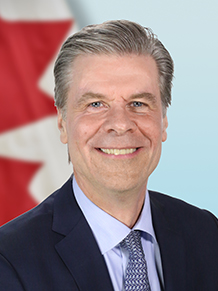
John Ossowski was appointed President of the Canada Border Services Agency (CBSA) on .
Prior to this appointment, John was Deputy Commissioner of the Canada Revenue Agency from to . He has also held senior positions as Associate Deputy Minister of Public Safety Canada and also as Assistant Secretary, International Affairs, Security and Justice Sector, at the Treasury Board Secretariat (TBS).
He has also worked at the Communications Security Establishment Canada (CSEC) where he was Director General, Policy and Communications and then Deputy Chief, Corporate Services. Before joining CSEC, Mr. Ossowski was Assistant Director, Government Relationships and Communications at the Financial Transactions and Reports Analysis Centre of Canada, which is Canada's financial intelligence unit. Previously, he spent a number of years at TBS in the Government Operations Sector and finally, as the Executive Assistant to the Secretary.
Mr. Ossowski has a bachelor's degree in Economics from the University of Victoria.
Paul MacKinnon
Executive Vice-President
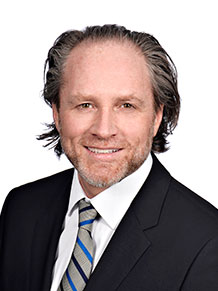
Paul MacKinnon was appointed Executive Vice-President of the CBSA on .
Prior to joining the CBSA, Mr. MacKinnon was the Assistant Deputy Minister of Strategic and Program Policy at Immigration, Refugees and Citizenship Canada (IRCC) from 2016 to 2019.
At IRCC, Mr. MacKinnon's responsibilities included leading consultations with national and international partners and stakeholders to advance Canada's broad immigration policy. He played a key role in developing recommendations to the Government on changes to Canada's asylum system.
Mr. MacKinnon served as Assistant Deputy Minister of Portfolio Affairs and Communications at Public Safety Canada from 2011 to 2016. In this position, he played a key role in working across the department and with Portfolio Agency partners in developing coordinated policy advice for the Minister and Deputy Minister. He also worked extensively on Canada-United States issues, including serving as the lead Canadian negotiator for the Agreement on Land, Rail, Marine and Air Transport Preclearance between the Government of Canada and the United States.
Previously, he was Director General of National Security Policy at Public Safety Canada where he was responsible for policy development on national security issues, including working with partners on the development of Canada's Counter Terrorism Strategy.
Mr. MacKinnon has a Bachelor of Arts, Political Science from the University of Prince Edward Island.
Kathy Thompson
Vice-President (Strategic Policy Branch)

Ms. Kathy Thompson joined the CBSA in , as Vice-President of the Strategic Policy Branch.
In her previous role, Ms. Thompson was Assistant Deputy Minister for the Community Safety and Countering Crime Branch, Public Safety Canada, from . In this position, she was responsible for developing legislation, policies and national strategies focused on policing, crime prevention, law enforcement, border strategies, corrections and community safety.
Ms. Thompson was also charged with providing policy advice to the Minister of Public Safety and Emergency Preparedness in carrying out his responsibilities and accountability for some of the Public Safety portfolio agencies, namely the Royal Canadian Mounted Police, CBSA, and Correctional Service Canada.
Prior to becoming Assistant Deputy Minister at Public Safety, Ms. Thompson was the Director General, Policy and Communications at Communications Security Establishment Canada (CSEC), from . Previously, she occupied several positions at CSEC since joining in 2004, including Director of the Industry Program in IT Security.
Prior to CSEC, Ms. Thompson was Director of Strategic and Operational Policy with the Financial Transactions and Reports Analysis Centre of Canada (FINTRAC).
Ms. Thompson spent over 10 years in the non-governmental sector, including with the Federation of Canadian Municipalities. She graduated from Carleton University in Ottawa with a Bachelor of Arts in law and psychology, with a concentration in Criminology.
Jonathan Moor
Vice-President and Chief Financial Officer (Finance and Corporate Management Branch)
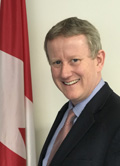
Jonathan Moor joined the CBSA as Vice-President, Comptrollership and Chief Financial Officer in . Comptrollership provides national leadership for the Agency's financial administration, security and professional standards, infrastructure and environmental operations, and contracting and material management.
Prior to joining the CBSA and coming to Canada on an interchange program with the UK Government, he held a number of senior roles in the UK's Department for Transport, where he was appointed to the Main Board in 2013.
In 2009, Mr. Moor was the UK's Director General for Civil Aviation responsible for aviation security and facilitation; air service negotiations; consumer; environmental; and regulatory policies. He was also Vice President of Eurocontrol and the European Civil Aviation Conference; and Chairman of ICAO's Evaluation and Audit Advisory Committee.
Mr. Moor trained as a Chartered Accountant in the private sector with Touche Ross & Co (now Deloitte), before moving to District Audit in 1992 and then the Audit Commission to work in a number of financial and corporate roles. In 2000, he was appointed as their Finance Director. In 2003, he joined the UK's Department for Transport as Group Finance Director of the Driver, Vehicle and Operator Group, before moving into a policy and program management role as Director of Airports Strategy in 2006 (responsible for the third runway program at Heathrow).
In the 2011 New Year's Honours List, Mr. Moor was awarded a CBE (Commander of the Order of the British Empire) for services to aviation.
Louise Youdale
Vice-President (Human Resources Branch)
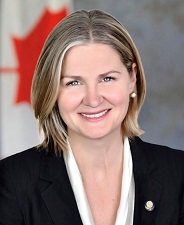
Ms. Louise Youdale was recently appointed Vice-President of Human Resources on .
Louise brings over 20 years of executive leadership to the CBSA, including time in both the private and public sectors. She was most recently the CIO and Director General, Information Management and Technology at the Canadian Nuclear Safety Commission, where she had also been Chief Human Resources Officer and Director General of Human Resources.
Louise also gained valuable human resources experience while working at Agriculture and Agri-Food Canada (DG, HR Operations / Client Services), the National Research Council (VP, HR), Alterna Savings and Alterna Bank (Senior VP, HR) and several other organizations.
She has dedicated her career to working with leaders to build organizational capability, shape culture and optimize performance.
Louise holds a Bachelor of Business Administration degree, with a concentration in Human Resources Management, from Bishop's University.
Minh Doan
Vice-President (Information, Science and Technology Branch)
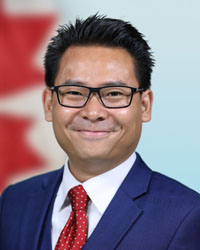
Mr. Minh Doan was appointed Vice-President of the Information, Science and Technology Branch (ISTB) on .
Since joining the CBSA in 2014 as the Director General of the Business Applications Services Directorate, Mr. Doan has also taken on the role of interim Vice-President of ISTB from until and Director General of Enterprise Architecture, Information Management and Common Services from September to .
Mr. Doan has over 17 years of private and public sector experience in leading enterprise IT projects, improving the efficiency of IT and aligning IT with business operations.
Before joining the CBSA, Mr. Doan was an Executive Director at Employment and Social Development Canada where he led major Business and Technology Transformation Projects. Prior to that he worked at the Privy Council Office (PCO) on Administrative Services Review and government-wide IT strategies to transform service delivery to Canadians. He has also held progressively more senior positions at Service Canada and Bell Canada.
Mr. Doan has a bachelor's degree in Computer Science from the Université du Québec and a certificate in Leading Change and Organizational Renewal from the Harvard Business School.
Jacques Cloutier
Vice-President (Intelligence and Enforcement Branch)
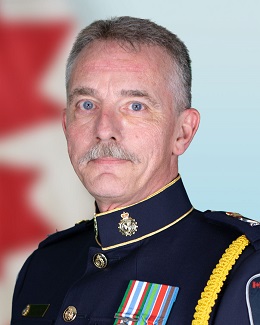
Mr. Jacques Cloutier was appointed Vice-President of the Intelligence and Enforcement Branch on .
Prior to this appointment, he held several senior executive positions with the CBSA such as Vice-President and Associate Vice-President of Operations Branch and Director General, International Region. Before coming to the CBSA, he held a number of senior executive positions related to national security at Public Safety, the Privy Council Office and the Communications Security Establishment.
Mr. Cloutier began his professional career in 1987, and as a reservist deployed to the former Yugoslavia as part of the United Nations Protection Force Canadian contingent. Upon completion of this mission, he joined the United Nations Volunteers and later the UN Department of Peace Keeping Operations as a civilian member and as a technical advisor in the context of peacekeeping missions in Africa's Great Lakes region and in Angola.
In 1995, Mr. Cloutier joined the Organization of American States and was part of the joint OAS/UN human rights mission in Haiti. His work involved the investigation of human rights violations alleged to have been committed by Agents of the State, capacity building and strengthening of government structures, principally in the policing, judicial and detention sectors.
Mr. Cloutier is a graduate of the Université de Sherbrooke and joined the Public Service in 2002, after completing a Master's Degree in Business Administration.
Denis R. Vinette
Vice-President (Travellers Branch)
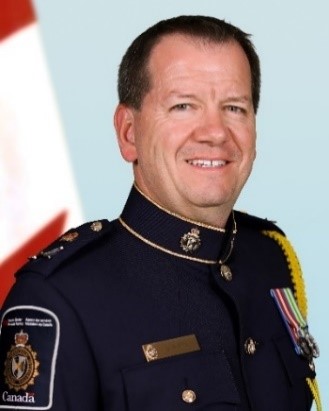
Mr. Denis Vinette is the Vice-President of the Travellers Branch and has enjoyed a distinguished career in border management spanning 27 years at the CBSA.
Prior to his current role as Vice-President of Travellers Branch, Mr. Vinette had been the Associate Vice-President of the Operations Branch since 2016.
Mr. Vinette was hired in 1992 as a Customs Inspector in Prescott, Ontario. He joined the management ranks when he became a Customs Superintendent in Cornwall and then the Chief of Operations at Macdonald Cartier International Airport in Ottawa.
He gained experience in increasingly more senior management positions including those of Director, Border Enforcement; Director, Personnel Security and Professional Standards; Director General, Strategic Planning and Integration; Regional Director General, Northern Ontario Region and Director General, Border Operations Directorate before becoming Vice-President.
Mr. Vinette has been recognized for his service, having been awarded a 2005 Public Service Award of Excellent and in 2012 both the Queen's Diamond Jubilee Medal and the Peace Officer Exemplary Service Medal.
Mr. Vinette graduated from the University of Ottawa and obtained a Bachelor of Social Sciences, with a concentration in Criminology and Psychology. [redacted]
Peter Hill
Vice-President (Commercial and Trade Branch)
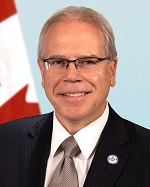
In , Peter Hill was appointed Vice-President, Commercial and Trade Branch, Canada Border Services Agency (CBSA).
Prior to this appointment, Mr. Hill served as Associate Vice President, Programs Branch, CBSA for 5 years with responsibility for the development and implementation of national programs; strategies; legal, regulatory and policy frameworks; and CBSA Renewal. Prior to that, he was Director General, Enforcement and Intelligence Programs Directorate, CBSA for 5 years.
Throughout his tenure at the Agency, Mr. Hill has provided leadership on strategic initiatives and partnerships to advance CBSA priorities in collaboration with other government departments and agencies, provincial and foreign governments, industry, non-governmental organizations, and academia.
Prior to joining the CBSA, Mr. Hill held executive positions at Communications Security Establishment Canada, Public Safety Canada and Health Canada. He began his career with the Canadian Security Intelligence Service in 1985.
Mr. Hill holds a Masters of Arts degree in Political Science from Carleton University in Ottawa. He is married with two children.
Lisa Anawati
Vice-President (CBSA Assessment and Revenue Management Branch)

Ms. Lisa Anawati joined the CBSA in as Vice-President of the CBSA Assessment and Revenue Management (CARM) Branch.
As Vice-President and Project Lead for the CARM project, Lisa is responsible for the successful delivery of the project. CARM is a multi-year business transformation initiative and once implemented, it will facilitate trade compliance and enhance the use of data analytics to streamline business processes.
Ms. Anawati has extensive experience in regional and national tax compliance and enforcement programs. Prior to joining the CBSA, Ms. Anawati was with the Canada Revenue Agency (CRA) where she was Acting Deputy Assistant Commissioner, International, Large Business and Investigations Branch. Her other positions at the CRA included Director General, International and Large Business; and Director General, GST/HST.
Ms. Anawati has a degree in Business Administration from the University of New Brunswick. She is also a Chartered Professional Accountant / Certified Management Accountant and holds a certificate in Public Sector Leadership and Governance from the University of Ottawa.
Patrick Boucher
Vice-President and Chief Transformation Officer (Transformation Branch)
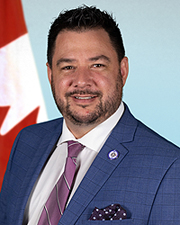
As Chief Transformation Officer and Vice President of the Transformation Branch, Mr. Patrick Boucher is responsible for providing leadership to the Agency for its transformation and modernization journey. He does this by leading a team that articulates and defines the Agency's transformation vision and by ensuring that the guidance needed to achieve that vision is in place – whether it be by setting strategic direction and priorities, by providing culture and change management expertise, or by working to identify and implement solutions to various business challenges across the Agency.
Prior to joining the CBSA, Mr. Boucher served at Justice Canada from 2017 to 2019 where he worked across government to ensure that the Crown was fulfilling its constitutional and international human rights obligations, including Aboriginal and treaty rights. In his role, he also supported the Government's mandate commitments towards advancing reconciliation and achieving a renewed nation-to-nation relationship with Indigenous peoples.
From 2009 to 2017, Mr. Boucher served in various key Director General positions at Public Safety Canada – most recently as Director General for Critical Infrastructure and Strategic Coordination in the National and Cyber Security Branch.
He holds a Master of Arts in Canadian Studies (Public Policy/Aboriginal Studies) from Carleton University and a Bachelor of Arts in Computer Science and is very proud of his Métis heritage.
He is a dedicated and passionate public servant, a recipient of the Public Service Award of Excellence, which recognizes public servants who have demonstrated excellence in achieving results for Canadians while demonstrating key leadership competencies, and a recipient of the Queen Elizabeth II Golden Jubilee Medal which was awarded to Canadians who have made outstanding and exemplary contributions to their communities and to Canada as a whole.
Mr. Boucher is a member of the Board of Directors at Desjardins, a volunteer with various community organizations and also a father of two.
Domestic and international partnerships
Overview
The CBSA is dependent on partnerships with federal, provincial and international governments, in addition to private sector partners and stakeholders in order to achieve its mandate. Leveraging partnerships gives CBSA access to the right information to make decisions that protect Canada and Canadians; provide for excellent service in safe and secure facilities; and, negotiate agreements and arrangements that contribute to modern, integrated global border management strategies.
Considerations
The CBSA administers more than 90 acts, regulations and international agreements, many on behalf of other federal departments and agencies. Working collaboratively with partners, the Agency is better positioned to set priorities and manage its operations by developing processes and designing controls that contribute to the safety and security of all Canadians, while facilitating the movement of admissible people and goods and providing excellent service.
Public Safety Portfolio and Other Key Federal Partners: Within the federal government, there are close working relationships the CBSA has with a number of other government departments in Canada, and working together abroad.
Within the Public Safety Portfolio, a key relationship is with the Royal Canadian Mounted Police (RCMP). The CBSA is responsible for controlling the movement of goods and people through Canadian ports of entry, whereas the RCMP is responsible for the control between the ports of entry and on First Nations reserves. Criminal investigations pursuant to Immigration and Refugee Protection Act (IRPA) are led by the CBSA, and those involving organized crime, human trafficking or national security issues are led by the RCMP. At the operational level, the RCMP leads a number of integrated teams in which the CBSA actively participates. The CBSA also collaborates with the Canadian Security Intelligence Service on national security issues and Correctional Services Canada as it relates to detention of non-Canadian citizens in violation of the IRPA.
Outside the Portfolio, Immigration, Refugees, and Citizenship Canada (IRCC) is a priority partner for the CBSA as the two organizations share responsibility for administering IRPA. Specifically, the CBSA is responsible for administering IRPA at Canadian ports of entry and enforcing it inland (in other words, investigations, detentions, removals, and appearances before the Immigration and Refugee Board). In addition, the CBSA supports the security screening process for the temporary and permanent resident applicants and provides intelligence support to IRCC. IRCC is responsible for processing applicants for temporary and permanent residence and their settlement and integration in Canada.
IRCC and the CBSA are working together to strengthen the integrity of the immigration program through the enhancement of screening tools, new controls and improved case management. There are a number of priority files on which the two organizations work together, such as admissibility and refugee determination issues, changes to visa requirements, international collaboration to facilitate removals and the development of improved and integrated services to those crossing our borders. Moreover, there is a shared agenda to advance technological innovations that will improve the effectiveness and efficiency of our operations, both inland and at ports of entry.
In addition to the above-noted organizations, the CBSA also collaborates closely with the Canadian Food Inspection Agency, Transport Canada, Department of Finance, Department of Fisheries and Oceans Canada (in other words, Canadian Coast Guard), Health Canada, and the Communication Security Establishment. Collaborative efforts allow us to support one another to fulfill our respective mandates.
Law enforcement partnerships and other levels of government: In operational contexts, the CBSA collaborates with regional-level partners, including municipal and provincial police services, health and welfare agencies, and provincial correctional institutions. These partners support the enforcement of the various acts administered by the CBSA.
Key Domestic Stakeholders: In the context of an increasingly globalized world, there are a large number of potential CBSA domestic stakeholders. Associations and individuals engaged in the commercial trade, business, immigration, human and civil rights, and travel and tourism sectors represent specific needs and interests of the Agency's clients and stakeholders. The CBSA works through a variety of fora to address concerns, and works collaboratively with external stakeholders when developing new policies and procedures.
Examples of key domestic stakeholders are:
- Air Transport Association of Canada
- BC Chamber of Shipping
- Canadian Association of Importers and Exporters
- Canadian Chamber of Commerce
- Canadian Council of Refugees
- Canadian Port Authority Association
- Canadian Red Cross
- Canadian Society of Customs Brokers
- Canadian Trucking Alliance
- Railway Association of Canada
- Shipping Federation of Canada
Stakeholder Consultative Committees: In addition to engaging individual stakeholders, the CBSA has 2 main consultative committees: the Border Commercial Consultative Committee (BCCC) and the Air Consultative Committee (ACC). The BCCC is comprised of, and addresses issues impacting, commercial stakeholders (in other words, carriers, brokers, importers, and freight forwarders).
The ACC is made up of airport authorities and airlines and the CBSA to address issues in the air mode that impact the competitiveness of Canadian airports, or the ability of CBSA to fulfil its mandate.
International Partners: The International Strategic Framework guides the Agency's international programs and partnerships. The Agency is dependent on international partners to provide access to information, facilities and tools abroad to interdict inadmissible people and goods at the earliest point in the travel or commercial continuum, and to disrupt illicit border-related activity impacting Canada. These objectives are often achieved through the negotiation of international agreements (for example, Customs Mutual Assistance Agreements, Free Trade Agreements), and arrangements. The CBSA participates in a number of international fora that help guide and contribute to achieving its strategic goals. 4 key international fora are highlighted below.
Five Country Ministerial (FCM): The FCM brings together the Ministers responsible for public safety and immigration in the Five Eyes (FVEY) countries [Australia, Canada, New Zealand, the United Kingdom and the United States] to engage on global security issues. The FCM provides strategic direction to guide current and future cooperation; establishes a more integrated policy-making and planning structure; identifies gaps/opportunities for further collaboration; and, improves accountability. Of note, the CBSA and Australia are co-leading work on a vision of the Border of the Future (BOTF).
Border Five (B5): The B5 is a high-level forum for relevant agency Heads from the FVEY to influence and shape border management discussions at an international level amongst advanced and trusted partners and to promote common interests on border security, intelligence, economic prosperity, and trade and travel facilitation.
Migration Five (M5): The CBSA actively participates in the M5, along with IRCC. The M5 is an international forum of immigration and border security agencies consisting of the FVEY. The forum shares best practices on information sharing, data, and intelligence to optimise immigration decision-making, attract and facilitate legitimate travellers, and deter and disrupt mala fide individuals.
B5 / M5 Chairmanship: The Chairmanship of the B5 and M5 alternates between participating countries annually. CBSA will assume the Chairmanship of B5 and co-chair of M5 with IRCC starting in .
World Customs Organization (WCO)
The WCO has 182 members, representing 98 % of global trade. It acts as a United Nations-like organization exclusively focused on customs matters with various technical, policy and decision-making bodies. Canada is seen as a leader in the forum, as it collaborates with key partners and helps set and advance the global customs agenda in a manner aligned with the Agency's and the Government of Canada's economic and security priorities, and in a way that supports WCO numbers.
Bilateral Relations
In addition to participating in multilateral fora, the CBSA engages with key bilateral partners to advance its international strategic objectives, outside of the Five Eyes community. The Agency also leverages relationships in key regions or countries to support and advance the CBSA's international objectives. This includes nurturing and developing international engagement with China, the European Union, France, Germany and Mexico.
United States
Given the volume of travellers, goods and services that cross our shared border on a daily basis - approximately 400,000 people every day and $1.4 million in trade every minute, and the importance of safety and security considerations associated with a shared border, the CBSA's relationship with its U.S. counterparts plays the most critical role amongst all of the Agency's partners in the management of the shared border.
On Canada-US border management issues, the CBSA engages primarily with U.S. Customs and Border Protection (CBP) and Immigration and Customs Enforcement (ICE), both of which are agencies under the Department of Homeland Security (DHS), currently the post of the Secretary of Homeland Security is vacant as Mr. McAleenan resigned October 11. Mr. McAleenan was formerly the Commissioner of U.S. CBP.
Mexico
Mexico is a key strategic partner in the Americas, in multilateral fora, and on trilateral issues with the U.S. The CBSA and its partners in Mexico work on initiatives and programs to facilitate the movement of people and goods. On Customs issues, the CBSA collaborates closely with the Tax Administration Service, which falls under the Secretary of Finance; on migration issues, our key interlocutor is the National Migration Institute, under the Ministry of the Interior.
Public reports and foundational documents
- National Directive for the Detention or Housing of Minors
- Departmental Results Framework
- Departmental Plan: 2019 to 2020
- Departmental Results Report: 2017 to 2018
- Forward Regulatory Plan: 2019 to 2021
- Annual Report on the Access to Information: 2017 to 2018
- Annual Report on Privacy: 2017 to 2018
Evergreen resources
- Border wait times
- NEXUS application
- Visitors to Canada
- CBSA service standards
- Asylum statistics
- Immigration, Refugees and Citizenship Canada
- Immigration and Refugee Board
- Detention statistics
- Removal statistics
Document navigation for Ministerial transition 2019
- Date modified: